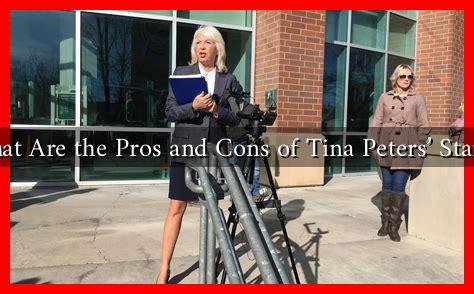-
Table of Contents
What Are the Pros and Cons of Tina Peters’ Stance?
Tina Peters, the former Mesa County Clerk in Colorado, has become a polarizing figure in the ongoing debate over election integrity in the United States. Her actions and statements regarding the 2020 presidential election have sparked significant discussion, both in support of and against her stance. This article aims to explore the pros and cons of Tina Peters’ position, providing a balanced view of her impact on the electoral process and public perception.
Background on Tina Peters
Tina Peters gained national attention after she alleged that there were irregularities in the 2020 election results in her county. She became a prominent advocate for election integrity, claiming that the voting systems used were vulnerable to fraud. Peters’ actions included unauthorized access to voting machines and the dissemination of sensitive election data, which she argued was necessary to expose what she believed to be systemic issues.
The Pros of Tina Peters’ Stance
Supporters of Tina Peters argue that her actions have brought important issues to light.
. Here are some of the pros associated with her stance:
- Advocacy for Election Integrity: Peters has galvanized a movement focused on ensuring that elections are fair and transparent. Her supporters believe that questioning the integrity of the electoral process is essential for democracy.
- Increased Public Awareness: By raising concerns about election security, Peters has sparked discussions among the public about the importance of safeguarding electoral systems. This has led to increased scrutiny of voting technologies and procedures.
- Empowerment of Grassroots Movements: Peters’ stance has inspired grassroots organizations and individuals to take action, advocating for reforms in election laws and practices. This has resulted in a more engaged electorate.
- Highlighting Vulnerabilities: Her claims have prompted investigations into the security of voting machines, leading to discussions about potential vulnerabilities that need to be addressed to maintain public trust in elections.
The Cons of Tina Peters’ Stance
On the other hand, Peters’ actions have also drawn significant criticism. Here are some of the cons associated with her stance:
- Legal and Ethical Concerns: Peters has faced legal challenges for her unauthorized access to voting machines. Critics argue that her actions undermine the integrity of the electoral process she claims to protect.
- Promotion of Misinformation: Many experts contend that Peters’ claims lack credible evidence and contribute to the spread of misinformation about the 2020 election. This can erode public trust in legitimate electoral processes.
- Polarization of Public Opinion: Peters’ stance has further divided an already polarized electorate. Supporters and detractors often find it challenging to engage in constructive dialogue about election integrity.
- Potential for Undermining Democracy: Critics argue that Peters’ actions could lead to a chilling effect on voter participation and confidence in elections, ultimately undermining democratic processes.
Case Studies and Examples
Several instances illustrate the impact of Peters’ stance on the broader conversation about election integrity:
- Arizona Audit: Following Peters’ claims, Arizona conducted a controversial audit of the 2020 election results, which ultimately reaffirmed the original outcome. This case highlights the potential consequences of questioning election integrity without substantial evidence.
- Legislative Changes: In some states, lawmakers have introduced bills aimed at increasing election security in response to concerns raised by Peters and her supporters. These changes may lead to more stringent voting laws, impacting voter access.
Conclusion
Tina Peters’ stance on election integrity has sparked a significant debate in the United States, highlighting both the importance of questioning electoral processes and the potential dangers of misinformation. While her advocacy has empowered some grassroots movements and increased public awareness, it has also raised legal and ethical concerns, contributing to polarization and the spread of misinformation. As the conversation around election integrity continues, it is crucial for citizens to engage critically with the information presented and seek out credible sources to inform their understanding of this complex issue.
For further reading on election integrity and related topics, you can visit Brennan Center for Justice.





